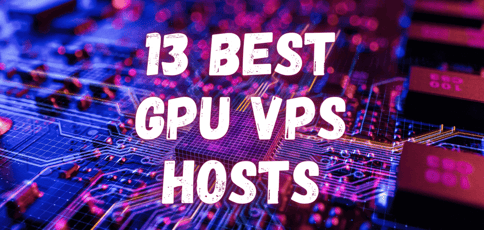
While it’s possible to complete certain computational tasks by simply using a computer’s CPU, RAM, or processor, other tasks may need a little more power than your computer can handle.
When you need more privacy, control, or support for workload-specific requirements (such as artificial intelligence and scientific computing), the best GPU VPS hosting services can do the job quickly.
Graphics processing units (GPUs) and virtual private servers (VPSes) go together like peanut butter and jelly, but we’ve done the research so you don’t have to. Here are our top picks.
-
Navigate This Article:
Best GPU Alternatives: CPU VPS Hosts
Before we look at GPU VPS hosting, let’s start with CPU VPS hosting as an alternative. I know this sounds slightly confusing, so I’ll briefly explain.
When we talk about a CPU VPS host, the focus is on providing strong CPU performance, ideal for tasks that require a lot of processing power.
This approach provides a robust hosting environment for CPU-reliant use cases such as those involving complex calculations. CPU-based virtual private servers are also much easier to come by than GPU VPS options, making them easier on your wallet.
1. Kamatera.com
- Cloud VPS that’s more flexible and affordable
- Load balancer, firewall, and managed services
- Premium Intel CPUs with 300% more power
- Choose between monthly or hourly billing
- Sign up today for a 30-day FREE trial
- Get started on Kamatera now.
VPS
RATING
★★★★★
Our Review
Backed by cutting-edge cloud computing technology, Kamatera adds instant and limitless scalability to the VPS hosting marketplace. Each cloud or virtual server is equipped with blazing-fast SSD storage and Intel Xeon Platinum CPUs. Go to full review »
| Setup Time | Disk Space | CPU | RAM |
|---|---|---|---|
| 5 minutes | 20 GB SSD – 4 TB SSD | 1 – 32 cores | 1 GB – 128 GB |
Kamatera opens the show with its virtual private cloud hosting solutions. You can consider it a cross between a cloud server and a VPS. And when you throw powerful CPUs into the mix, you’ll have a serious machine in front of you.
We’re talking about the combination of a CPU’s processing power, VPS privacy, and the cloud environment’s elasticity and reliability. But since our focus in this section is on CPUs, Kamatera allows you to add up to 32 CPU cores on its virtual machines, boosting performance even further.
2. IONOS.com
- Affordable VPS hosting with no hidden fees
- Try it FREE via 30-day money-back guarantee
- Full root access and API
- 10GB to 240GB SSD, Linux or Windows
- No throttling or traffic restrictions, ever
- Get started on 1&1 IONOS now.
VPS
RATING
★★★★★
Our Review
For an all-star player in the game of web hosting flexibility, look no further than the low-cost options from 1&1 IONOS. The company’s vServers are a powerful VPS option that includes dedicated resources and unlimited traffic. Go to full review »
| Setup Time | Disk Space | CPU | RAM |
|---|---|---|---|
| 6 minutes | 10 GB NVMe – 640 GB NVMe | 1 – 12 cores | 1 GB – 24 GB |
IONOS and Kamatera read from the same script, but IONOS brings one more trait into the picture: superb affordability. This is the ideal cloud VPS hosting provider if you are looking for a powerful CPU, a private network, and an elastic GPU service at affordable prices.
But Kamatera beats IONOS if you’re looking for more CPU cores. While Kamatera can stretch all the way to 32 cores, IONOS stops at 12. Make no mistake, though; a dozen CPU cores aren’t slow. To put it in perspective, some of the most CPU-intensive games I know need about eight CPU cores.
3. A2Hosting.com
- Turbo server & cache options for faster page loads
- Well-built plans starting with 4GB RAM
- FREE CDN plus auto-installs with Softaculous
- Multilingual support and up to unlimited databases
- Enhanced security with and daily kernel updates
- Get started on A2 Hosting now.
VPS
RATING
★★★★★
Our Review
While A2 Hosting’s turbocharged shared hosting platform gives site owners ample room to grow, the company’s tech prowess is on full display with its portfolio of VPS options. Ranging from unmanaged, bare-metal environments to stress-free, fully managed space, A2 Hosting is sure to have the perfect option for your expanding online presence. Go to full review »
| Setup Time | Disk Space | CPU | RAM |
|---|---|---|---|
| 7 minutes | 20 GB SSD – 450 GB SSD | 1 – 10 cores | 1 GB – 32 GB |
A2 Hosting offers up to 20 times faster speeds, but that’s not just another marketing gimmick. Its powerful CPUs are part of the secret behind the lightning-fast speeds the host offers.
Its Turbo-boosted plans, for example, have up to four CPU cores, and that’s just with its shared hosting plans. If you slide the scale higher and land on its dedicated server hosting plans, you’ll get about 10 cores with 20 threads.
What this means is that the 10 cores are essentially 10 workers handling different tasks at the same time. So, 20 threads with 10 cores means each core can handle two tasks (threads) simultaneously. This setup can give you much better speed and performance.
Best GPU VPS Hosts
Now, let’s get into the day’s main business: GPU VPS hosting providers. Here, you have quite a few options to choose from, so we’ll dive right in.
4. Vultr
Vultr makes the list thanks to its wide range of GPU server hosting options designed to handle different tasks. Whether you’re looking for improved gaming graphics or something that makes data analytics easier, you’ll find these and so many other options with Vultr.
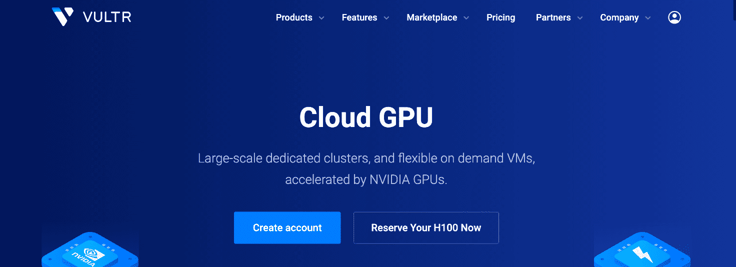
Powered by NVIDIA, one of the major players in the world of graphics and computing technology, Vultr’s GPU stack can handle the fluctuating demands of cloud computing. The GPU stack comprises the NVIDIA CUDA toolkit for programming, NVIDIA cuDNN for machine learning, and NVIDIA Drivers, which help the operating system and programs run NVIDIA GPU.
5. OVHCloud
We recommend OVHCloud if you’re looking for a GPU VPS host to run computational work rather than for gaming or consumer graphics (although it can handle almost anything you throw at it). NVIDIA Tesla V100S, known for handling parallel computing tasks, makes this cloud GPU service incredibly powerful for applications that process data simultaneously.
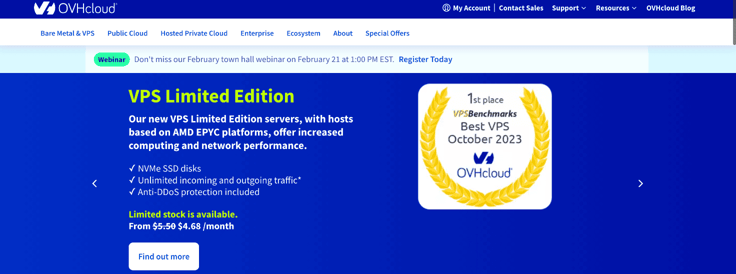
Let’s say you want to train complex neural networks in Artificial Intelligence research or run sophisticated, GPU-intensive scientific simulations, such as image recognition. With OVHCloud’s powerful hardware, which includes top-of-the-line GPUs, you’ll have the right environment to test drive or launch your project.
6. Linode
Linode (soon to be Akamai) uses industry-leading GPU hardware, such as NVIDIA Quadro RTX 6000 (one of the best in the market), to provide a robust hosting environment for resource-intensive projects. Even better, the host manages the hardware so you can focus on running your project.
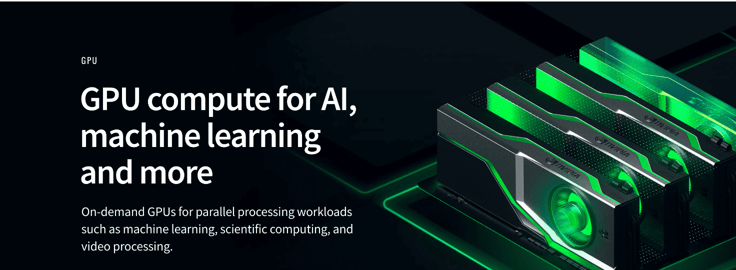
Linode also offers scalable GPU VPS hosting plans. If one GPU graphics card isn’t enough for your workload, you can always add up to four graphics cards per GPU instance.
7. AWS
Amazon Web Services (AWS) needs no introduction in the cloud hosting world. In fact, it is the world’s largest cloud hosting service by market share. Now, imagine what the host would do if it added the power of NVIDIA GPUs to its existing robust cloud infrastructure.
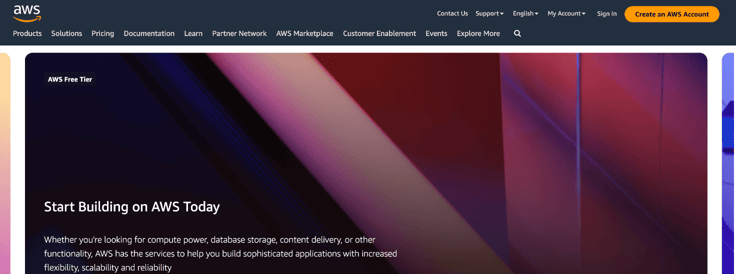
There is no need to imagine, as Amazon’s partnership with NVIDIA is now a reality. The cloud GPU hosting giant also offers a free trial. This powerful partnership suits enterprise-level clients in key industries such as healthcare, finance, media and entertainment, telecommunications, and the automotive industry.
8. Google Cloud
Only a handful of hosting providers with cloud GPUs can lace Google Cloud’s boots. The company has invested billions of dollars in its cloud-hosting infrastructure, including GPUs. Looking at the variety Google Cloud offers should tell you everything you need to know about its status in the cloud hosting industry and its commitment to cementing its position among the greats.

While other traditional GPU VPS hosts will give you one or two options, Google Cloud has seven different types of GPUs. That gives you the freedom to choose what suits your workload. And that’s not all — you can add up to eight GPUs per instance per individual workload. We haven’t even looked at other resources such as processor, memory, and storage, all of which you can fine-tune to achieve your desired performance.
9. Microsoft Azure
It’s almost a taboo to mention Amazon and Google without giving Microsoft a shoutout. These are the brains behind some of the greatest digital inventions of our time. But Microsoft Azure isn’t here because of its famous parent company, Microsoft; it’s actually here by merit.

With this host, you’ll have different GPU options under the N Series umbrella. The NC series works best for machine learning workloads, while the ND series, on the other hand, suits training and inference scenarios. Lastly, the NV series offers exceptional GPU performance for remote visualization workloads.
10. Lambda Labs
Lambda’s portfolio includes big names like Sony, Samsung, and Picsart. That shows you’re dealing with a top GPU VPS cloud provider. Like many other hosts we’ve discussed, Lambda uses NVIDIA GPUs built for computing power and performance.
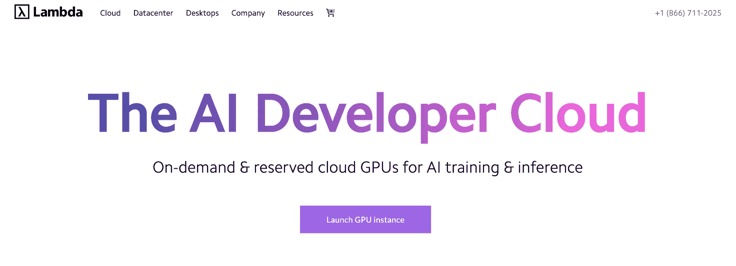
The company also allows you to choose between a public and private cloud. As you would expect, the public cloud option is cheaper than the private option and works best for short-term workloads. Opting for a private cloud requires long-term commitment, which ranges between one to three years.
11. LeaderGPU
Based in Amsterdam, LeaderGPU makes GPU VPS hosting straightforward. It lists servers based on availability, so you can choose one that matches your specifications. Alternatively, you can use its filter tool to customize the server’s GPU by type and amount.
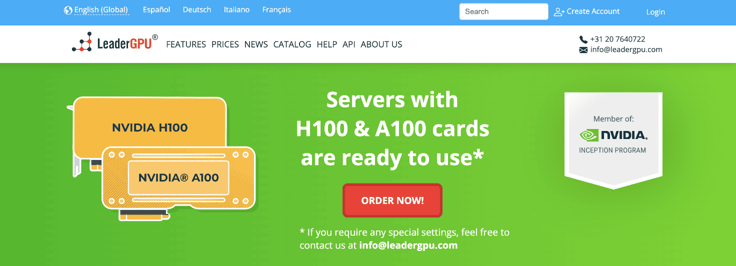
You also may notice that it doesn’t only offer workload-specific GPUs. Whether you need a GPU for deep learning, blockchain processing, or multipurpose, you’ll find exactly what you’re looking for. The only downside is that some servers may not be instantly available, so you could have to wait to get them.
12. King Servers
King Servers is a bold name for a GPU VPS host, but this host lives up to it. Many GPU hosts we’ve seen so far cost an arm and a leg. But King Servers offers VPS hosting plans that cost almost the same as other hosts offer for standard CPU VPS packages.
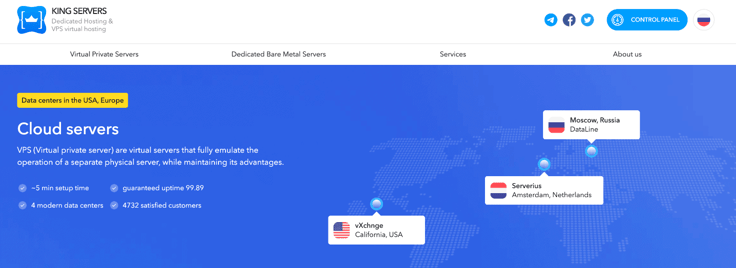
The setup process takes less than five minutes. That, coupled with the fully redundant infrastructure, unlimited traffic, and 24/7 technical support, makes this host worthy of a spot here.
13. Hostkey
Hostkey wraps up our countdown with an easy setup process (takes less than 15 minutes) and its robust GPU VPS hosting infrastructure. You can choose an instant virtual server or opt for a fully customizable GPU dedicated server, which costs slightly more.

Each plan has powerful and well-designed features, including NVIDIA RTX GPU cards, pre-installed TensorFlow and Pytorch for model training, and high-performance computing hardware.
The host also uses multi-GPU card notes, making its VPS GPU plans more affordable. That’s because each virtual machine doesn’t need its own separate hardware, which is expensive to maintain. On the contrary, they all share the resources of the big, powerful computer (multi-card node).
What Is GPU VPS Hosting?
GPU VPS Hosting is when a virtual private server includes a graphics processing unit in the hosting environment. Traditionally, VPS hosting provides a portion of a server’s resources, such as CPU, RAM, and storage, to a user.
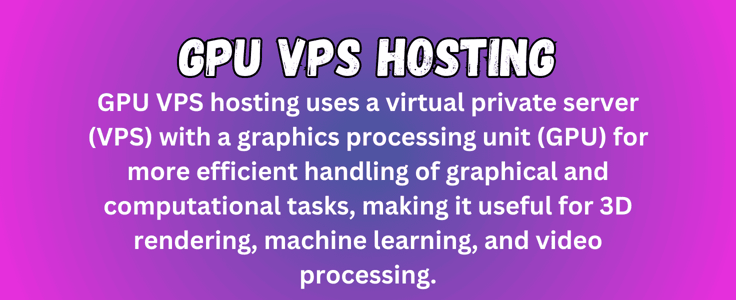
Throwing a GPU in the equation is a game changer because GPUs help handle graphical and computational tasks more efficiently than a regular CPU. This is what you need for tasks that require intensive graphical processing or parallel computing capabilities, including 3D rendering, machine learning, and video processing.
CPU and GPU: What’s the Difference?
These two may sound similar, but they are very different. The key difference here lies in their design. A CPU is what you would consider the computer’s brain. It handles various tasks and manages the overall operation of the system.
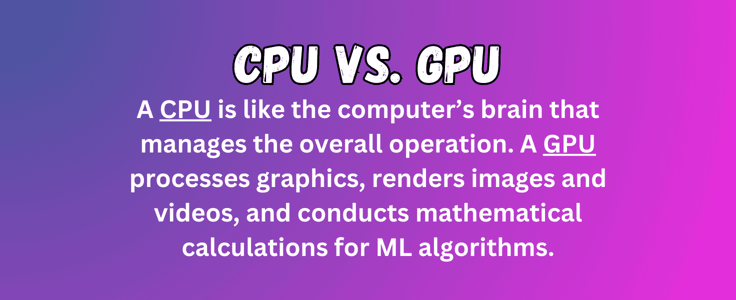
On the other hand, a GPU takes charge of processing graphics and rendering images and videos. Don’t forget that its capabilities extend beyond graphics: You can use GPUs to render pixels and conduct mathematical calculations for machine learning algorithms.
Which Is the Best GPU for Deepfakes?
Deepfake technology is a product of deep learning algorithms. That’s one area where high-end GPUs from NVIDIA’s GeForce RTX series, such as the RTX 3080 or RTX 3090, really excel due to their robust performance in deep learning tasks.
As we covered earlier, Dutch hosting provider Hostkey is an excellent example of a web host that uses RTX GPUs.
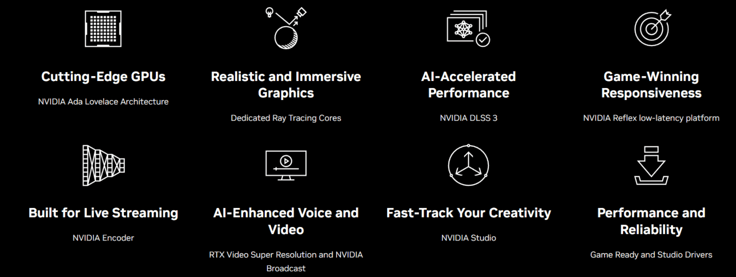
But the best GPU can depend on the specific requirements and constraints of the user. For example, a user just starting with deepfakes or working on smaller projects may not need the raw power of an RTX 3090. Instead, the RTX 3070 or even the GTX 1660 Ti are friendlier on your wallet and will still offer decent performance for deep learning tasks.
Can I Rent a GPU for AI?
Yes, you can rent a GPU for AI, and you also have many options to choose from. In fact, one of the most common reasons companies use GPU-powered VPS is for AI and machine learning applications.
Renting a GPU offers the advantage of accessing high-end, powerful GPU resources without the upfront cost of purchasing expensive hardware.
This option is also beneficial for handling workloads that require significant computational power for a limited period. Additionally, rented servers mostly come with integrated machine learning frameworks and tools, which can streamline the AI development process.
Which GPU Is Best for AI?
The GPU that will work best for your AI or ML project depends on what exactly you plan to do with it. These requirements can range from the complexity of the models to the size of the datasets and your budget. The best GPU for an independent developer will differ from the best GPU for an enterprise organization.
NVIDIA GPUs work best for high-end projects (such as those run by enterprises) because of their excellent performance in parallel processing — an essential requirement for AI and machine learning tasks. In particular, the NVIDIA Tesla V100 or the more recent A100 are often considered the gold standard.
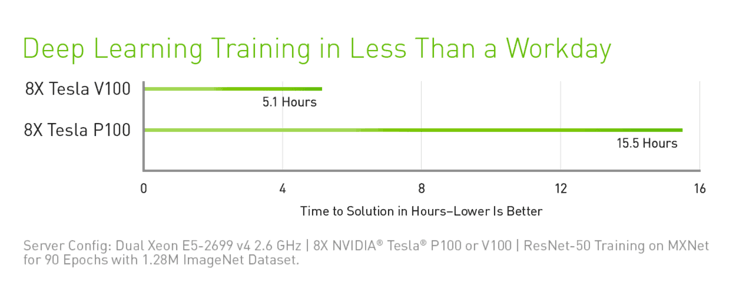
If you’re a developer on a budget or working on less demanding projects, the NVIDIA GeForce RTX series (such as the RTX 3080 or 3090) is more affordable and still powerful. Linode and Hostkey are good examples of hosts that use RTX GPUs and offer affordable packages.
How Do I Choose a Virtual Private Server?
Choosing a VPS can be daunting if you’re new to web hosting. A good place to start is by considering the amount of CPU power, RAM, and storage you’ll need. These three will dictate the server’s overall performance.
Here’s a high-level overview of everything you need to know:
- Ample bandwidth: If you expect your website or application to receive high traffic, you need a high bandwidth limit or, even better, unlimited bandwidth.
- A 99.9% uptime guarantee: Look for providers offering high uptime guarantees (99.9% or higher). Anything below that shouldn’t be an option.
- Scalability and flexibility: The ability to upgrade resources as your needs grow, also known as scalability, is essential when working on a growth-oriented project. This also applies if you expect fluctuations in traffic. To be on the safer side, you could opt for cloud hosting since it’s known for scalability and reliability.
- Security: The host should provide robust security measures, including firewalls, DDoS protection, and regular backups at the bare minimum. Depending on your reason for renting the server, you may need more advanced security features such as intrusion detection and prevention systems, zero trust architecture, and file integrity monitoring.
Once you’ve narrowed your search, other factors, such as the type of operating systems offered, customer support, and budget, should come immediately.
Pro tip: If you’re concerned about choosing a GPU VPS host’s financial commitment, look for providers offering money-back guarantees. Many companies give you 30 days to request a refund if the product doesn’t work out for you.
GPU and VPS: A Match Made in Hosting Heaven
GPUs have gone from being used by gamers to improve graphics to helping with machine learning and artificial intelligence research.
And with the rise of AI in recent years, GPUs are working overtime to help create inventions that will forever change the digital world.
Whether you’re a tech geek, gaming enthusiast, or just a regular user exploring the world of GPU hosting, having a GPU VPS server means added power, better performance, and, above all, more possibilities.
HostingAdvice.com is a free online resource that offers valuable content and comparison services to users. To keep this resource 100% free, we receive compensation from many of the offers listed on the site. Along with key review factors, this compensation may impact how and where products appear across the site (including, for example, the order in which they appear). HostingAdvice.com does not include the entire universe of available offers. Editorial opinions expressed on the site are strictly our own and are not provided, endorsed, or approved by advertisers.
Our site is committed to publishing independent, accurate content guided by strict editorial guidelines. Before articles and reviews are published on our site, they undergo a thorough review process performed by a team of independent editors and subject-matter experts to ensure the content’s accuracy, timeliness, and impartiality. Our editorial team is separate and independent of our site’s advertisers, and the opinions they express on our site are their own. To read more about our team members and their editorial backgrounds, please visit our site’s About page.











